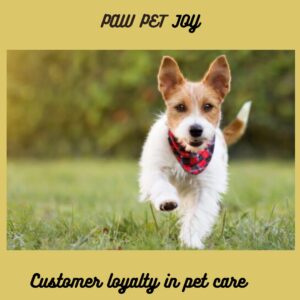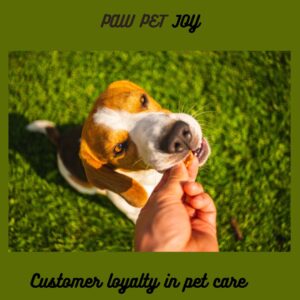Customer loyalty in pet care offering insights and strategies for pet care businesses to build and maintain strong, lasting relationships with their clients.
Introduction
In the competitive world of pet care, customer loyalty is more than just a nice-to-have; it’s a crucial element for long-term success. With pet ownership on the rise globally, the pet care industry is experiencing unprecedented growth. However, this also means increased competition, making customer retention and loyalty more challenging and vital than ever.

Understanding Customer Loyalty in Pet Care
Customer loyalty in pet care refers to the continued preference of customers for a specific brand, service provider, or product over time. Loyal customers are those who consistently choose your pet care services or products, even when presented with other options. They are more likely to engage in repeat purchases, refer your business to others, and provide positive reviews.
Building customer loyalty in pet care goes beyond offering quality products or services; it involves creating a deep emotional connection with customers. Pet owners view their pets as family members, and their trust in your brand is rooted in how well you cater to their pets’ needs and how you make them feel valued as customers.
The Importance of Customer Loyalty in Pet Care
- Increased Revenue: Loyal customers are more likely to spend more on your services and products over time. They are also less price-sensitive, meaning they are willing to pay a premium for the brands they trust.
- Cost-Effective Marketing: Retaining existing customers is often more cost-effective than acquiring new ones. Loyal customers are more likely to engage in word-of-mouth marketing, sharing their positive experiences with friends, family, and online communities.
- Enhanced Brand Reputation: A strong base of loyal customers can significantly enhance your brand’s reputation. Positive reviews and testimonials from loyal customers can attract new customers and build credibility.
- Resilience in Tough Times: During economic downturns or market disruptions, loyal customers are more likely to stick with your brand, providing a stable revenue stream even when new customer acquisition slows down.
Strategies for Building Customer Loyalty in Pet Care
- Personalized Customer Service
Personalization is key to building customer loyalty in the pet care industry. Pet owners appreciate when businesses take the time to understand their specific needs and preferences. Implementing a customer relationship management (CRM) system can help you track customer interactions, preferences, and purchase history, allowing you to offer tailored recommendations and services.
Example: If you run a pet grooming salon, you can use your CRM to note the specific grooming preferences of each pet, such as the type of shampoo used or the preferred haircut style. This attention to detail can make customers feel valued and understood.

- Loyalty Programs
Loyalty programs are a proven way to incentivize repeat business. Offering rewards, discounts, or exclusive offers to returning customers can encourage them to continue choosing your brand. Consider creating a tiered loyalty program where customers earn points for every purchase, which they can redeem for discounts or free services.
Example: A pet store could offer a loyalty card where customers earn points with every purchase. Once they reach a certain number of points, they could redeem them for a free bag of pet food or a discounted grooming session.
- Engage with Customers Online
In today’s digital age, engaging with customers online is crucial for building loyalty. Maintain an active presence on social media platforms, where you can share helpful tips, answer customer questions, and showcase your products or services. Regularly updating your blog with informative content related to pet care can also position your brand as a trusted authority in the industry.
Example: You could create a Facebook group for pet owners where they can ask questions, share experiences, and get advice from your team. This builds a community around your brand and fosters loyalty among members.
- Provide Exceptional Value
To stand out in the competitive pet care market, your products and services must offer exceptional value. This doesn’t necessarily mean being the cheapest option but rather providing a unique combination of quality, convenience, and customer service that justifies you’re pricing.
Example: If you offer pet boarding services, you could differentiate yourself by providing daily photo updates to pet owners, showing them how their pets are doing. This added touch can reassure customers and make them more likely to choose your services again.
- Solicit and Act on Customer Feedback
Feedback from customers is invaluable for improving your services and building loyalty. Regularly solicit feedback through surveys, reviews, or direct conversations, and make sure to act on the insights you gather. Addressing customer concerns promptly and effectively shows that you value their opinions and are committed to providing the best possible experience.
Example: After a grooming session, you could send a follow-up email asking the customer how satisfied they were with the service and if there is anything you could improve. This not only helps you improve but also makes the customer feel heard and appreciated.

Challenges in Building Customer Loyalty in Pet Care
While the benefits of customer loyalty are clear, achieving it in the pet care industry comes with unique challenges:
- Emotional Sensitivity: Pet owners are emotionally invested in their pets, making them more sensitive to any issues or mistakes. A negative experience can quickly erode trust and loyalty.
- High Competition: The pet care industry is highly competitive, with numerous brands and services vying for customers’ attention. Standing out requires consistent excellence in customer service and product quality.
- Evolving Customer Expectations: As the pet care industry evolves, so do customer expectations. Businesses must stay ahead of trends and continuously adapt their offerings to meet changing demands.
- Price Sensitivity: While loyal customers are often willing to pay a premium, price remains a critical factor for many pet owners. Balancing quality and affordability is essential for maintaining loyalty.
The Role of Technology in Enhancing Customer Loyalty
Technology plays a significant role in building and maintaining customer loyalty in the pet care industry. From CRM systems to mobile apps, leveraging technology can help businesses streamline operations, personalize customer interactions, and deliver exceptional service.
CRM Systems: As mentioned earlier, CRM systems enable businesses to track customer interactions, preferences, and purchase history. This information can be used to personalize services, offer targeted promotions, and ensure consistent communication.
Mobile Apps: Developing a mobile app for your pet care business can enhance customer engagement and loyalty. An app can provide customers with convenient access to services, such as booking appointments, tracking loyalty points, and receiving personalized offers.
Online Reviews and Social Proof: Encouraging satisfied customers to leave online reviews can boost your brand’s credibility and attract new customers. Positive reviews act as social proof, influencing potential customers’ purchasing decisions.

FAQs on Customer Loyalty in Pet Care
Q1: Why is customer loyalty important in the pet care industry?
Customer loyalty is crucial in the pet care industry because it leads to increased revenue, cost-effective marketing, enhanced brand reputation, and resilience during economic downturns. Loyal customers are more likely to engage in repeat business, refer others, and provide positive reviews.
Q2: How can I build customer loyalty in my pet care business?
You can build customer loyalty by offering personalized customer service, implementing a loyalty program, engaging with customer’s online, providing exceptional value, and soliciting and acting on customer feedback.
Q3: What challenges might I face in building customer loyalty?
Challenges include emotional sensitivity among pet owners, high competition in the industry, evolving customer expectations, and price sensitivity. Overcoming these challenges requires consistent excellence in customer service, quality products, and adaptability.
Q4: How does technology help in enhancing customer loyalty?
Technology, such as CRM systems and mobile apps, helps businesses personalize customer interactions, streamline operations, and deliver exceptional service. Online reviews and social proof also play a significant role in enhancing customer loyalty.
Q5: What are some examples of successful loyalty programs in pet care?
Examples include loyalty cards where customers earn points for purchases that can be redeemed for discounts or free services. Tiered loyalty programs, where customers receive increasing rewards as they spend more, are also effective in the pet care industry.
Bullet Points: Key Takeaways on Customer Loyalty in Pet Care
- Personalized customer service and understanding pet owners’ specific needs are crucial for building loyalty.
- Implementing loyalty programs and engaging with customers online can significantly enhance customer retention.
- Providing exceptional value and consistently acting on customer feedback fosters long-term loyalty.
- The pet care industry faces unique challenges in building loyalty, including emotional sensitivity and high competition.
- Leveraging technology, such as CRM systems and mobile apps, can streamline customer interactions and enhance loyalty.
Conclusion
Customer loyalty in the pet care industry is a multifaceted endeavor that requires a deep understanding of pet owners’ needs, emotions, and expectations. By focusing on personalized service, implementing effective loyalty programs, and leveraging technology, pet care businesses can build lasting relationships with their customers. Despite the challenges, the rewards of customer loyalty—such as increased revenue, enhanced brand reputation, and a stable customer base—make it a worthy investment for any pet care business.
